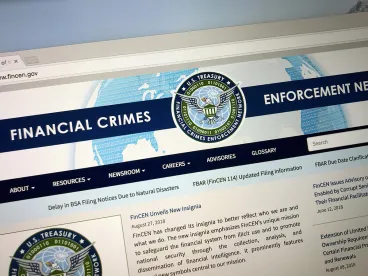Starting on 1 January 2024, entities will need to comply with the reporting rules under the Corporate Transparency Act (CTA).1 The implementing Treasury regulations were published on 30 September 2022.2 The CTA applies both to US entities and to foreign entities doing business in the United States, and it is likely to have significant implications for domestic and foreign businesses as it imposes new reporting burdens on such entities, requiring a fact specific analysis for each entity’s unique circumstances. Information sharing of CTA information will also open the door to expanded risks to businesses from government enforcement and investigations; which merits serious consideration by affected businesses of new internal reviews to consider potential disclosure issues.
Implemented to combat the use of shell corporations and other entities to facilitate money laundering and other illicit activities, the CTA requires domestic and foreign “Reporting Companies” to report certain identifying information about their beneficial owners to the Treasury Department’s Financial Crimes Enforcement Network (FinCEN). FinCEN estimates 32.6 million Reporting Companies will be subject to these reporting rules when they go into effect and an additional 5 million entities will become Reporting Companies each year thereafter.3
The applicability of the reporting regime is determined on an entity-by-entity basis. For Reporting Companies currently in existence, beneficial owner information (BOI) will need to be provided to FinCEN prior to 1 January 2025.4 For Reporting Companies that are formed or registered on or after 1 January 2024, reporting is required within 30 days of the acceptance of the company’s formation or registration filing. Similarly, a change in beneficial ownership or a change in exemption status would also need to be reported within 30 days of such change. Reporting Companies should give consideration to their processes for gathering, reporting, and safeguarding BOI to be reported to FinCEN.
WHO IS SUBJECT TO REPORTING? DEFINITION OF A “REPORTING COMPANY”
A “Reporting Company” is a domestic or foreign corporation, limited liability company, or similar entity that was either formed or registered to do business in any state or jurisdiction by filing a document with a secretary of state or other similar office and which does not qualify for an exemption.
There are 23 types of entities that are exempt from the reporting requirements. Most of the exemptions apply to entities that are already subject to substantial federal reporting requirements, such as public companies, banks, securities brokers and dealers, insurance companies, registered investment companies and advisors, and pooled investment companies, among others. Also exempt are “large operating companies” (defined as a company with more than 20 full time employees, an operating presence in a physical office within the United States, and a filed Federal income tax or information return in the United States for the previous year demonstrating more than US$5 million in gross receipts or sales from US sources),5 tax-exempt entities, wholly owned subsidiaries of certain exempt entities, and inactive entities.6
Although the application of these rules may be straight forward in many cases, tiered entity structures will add complexity in determining how the rules apply and what BOI, if any, needs to be reported with respect to each entity. In addition, on-going compliance may be difficult as changes at upper-tier entities may have implications for lower-tier entities—for example, a change in upstream ownership may cause an exemption to no longer apply triggering reporting requirements for subsidiaries.
IDENTIFYING BENEFICIAL OWNERS
For reporting purposes, a beneficial owner is any individual who, directly or indirectly, through any contract, arrangement, understanding, relationship, or otherwise either exercises substantial control over the reporting company or owns or controls at least 25% of the ownership interests of the reporting company.7 A Reporting Company will always have at least one owner with substantial control and possibly several owners with such control, even if no individual holds a 25% ownership interest.
Exercising Substantial Control
Substantial control generally means control over important decisions of the Reporting Company. Under the regulations, an individual exercises substantial control over a Reporting Company if the individual:
- Serves as a senior officer of the Reporting Company, defined as a CEO, CFO, COO, and general counsel, or any other officer who performs a similar function (the roles of secretary and treasurer are excluded because their functions are viewed as ministerial, with little control over the company);8
- Has authority over the appointment or removal of any senior officer or a majority of the board of directors;9
- Directs, determines, or has substantial influence over important decisions made by the Reporting Company (such decisions include those addressing the nature, scope, and attributes of the business, including the sale, lease, mortgage, or other transfer of any principal assets of the Reporting Company; the reorganization, dissolution, or merger of the Reporting Company; and major expenditures or investments, issuances of any equity, the incurrence of any significant debt, or approval of the operating budget of the Reporting Company among others); or10
- Has any other form of substantial control over the Reporting Company.11
Owns or Controls Ownership Interests
An ownership interest for purposes of determining beneficial ownership under the CTA is defined broadly and takes into account a variety of arrangements and ownership interests. In addition to stock and other equity interests, capital interest, and profits interests, put, call, and straddles may also be taken into account, as well as debt instruments with equity like features, in determining whether the 25% threshold is met. For these purposes, the total ownership interests that an individual owns or controls, directly or indirectly, is calculated as a percentage of the total outstanding ownership interests of the Reporting Company, and assumes all options are exercised.12
For Reporting Companies that issue capital or profit interests, an individual’s ownership interests are the capital and profit interests in the entity, calculated as a percentage of the total outstanding capital and profit interests in such entity. For Reporting Companies that issue shares of stock, the threshold is measured as a percentage of the greater of either the total voting power of all ownership interests entitled to vote or the total outstanding value of all classes of ownership interests. However, if the percentage of an ownership interest cannot be determined with “reasonable certainty” using this method, any individual owning or controlling 25% of any class or type of ownership interest of a Reporting Company will be deemed to own or control 25% of all ownership interests in the Reporting Company.13
There are five exceptions for when an individual who otherwise would be a beneficial owner of a Reporting Company is exempt: (i) a minor child if the Reporting Company provides information about a parent or legal guardian; (ii) an individual acting as a nominee, intermediary, custodian, or agent on behalf of another individual; (iii) an employee, acting solely as an employee, whose substantial control over or economic benefits from such entity are derived solely from the employment status of the employee and who is not a senior officer; (iv) an individual whose only interest is a future interest through a right of inheritance; and (v) a creditor.14
Identifying Company Applicant
A “Company Applicant” is the individual who directly files the document that creates the Reporting Company or registers the company to do business in the United States, and the individual who is primarily responsible for directing or controlling such filing. There can be more than one Company Applicant.16
Information to be Reported
The Reporting Company will be required to provide identification information about itself, its beneficial owners, and Company Applicants. Information required about the Reporting Company itself includes:
- The full legal name and any trade name or “doing business as” name of the Reporting Company;
- A complete current address;
- The State, Tribal, or foreign jurisdiction of formation or registration of the Reporting Company; and
- The IRS Taxpayer Identification Number (TIN) (including an Employer Identification Number) of the Reporting Company.17
For each beneficial owner and Company Applicant, the applicable Reporting Company must submit to FinCEN the individual’s full legal name, date of birth, complete current address (in the case of a Company Applicant, a business address may be used, in all other cases a residential address must be used), and a unique identifying number from an acceptable identification document, as well as copies of such documents.18 In lieu of acceptable identification documentation, an individual or company who is required to provide information to a Reporting Company may provide a unique identifier assigned by FinCEN (FinCEN Identifier). FinCEN will store BOI for no fewer than five years after the date on which the Reporting Company terminates.19
FINCEN IDENTIFIER
A FinCEN Identifier is a unique number issued by FinCEN to an individual or entity upon request that can be used in lieu of BOI for reporting purposes. The use of a FinCEN Identifier puts the burden of updating the applicable BOI on the applicable individual or Reporting Company as each FinCEN Identifier is specific to the individual or Reporting Company.20 The applicable individual or Reporting Company must file an updated application reflecting the change within 30 calendar days after the date on which: (i) a change occurs; or (ii) the individual or Reporting Company becomes aware or has reason to know of the inaccuracy in the application.
Under proposed rules, an individual may submit an application for a FinCEN Identifier that contains all of the BOI that otherwise has to be set forth in the initial report about that individual. A Reporting Company may obtain a FinCEN Identifier by submitting to FinCEN an application only at or after the time that the entity submits an initial report.21
ACCESS TO BOI
BOI will be provided upon request by a federal agency engaged in national security, intelligence, or law enforcement activity and to a State, local, or Tribal law enforcement agency if a court of competent jurisdiction has authorized the law enforcement agency to seek the information in a criminal or civil investigation.22 With the consent of the Reporting Company, a financial institution can obtain BOI to facilitate compliance with customer due diligence requirements of a financial institution23
Congress has directed Treasury to maintain BOI in a “secure nonpublic database, using information security methods and techniques that are appropriate to protect non-classified information security systems at the highest security level.”24 FinCEN has been developing the Beneficial Ownership Secure System (BOSS) to receive, store, and maintain BOI to comply with this requirement.25 BOSS is expected to open on 1 January 2024, and Reporting Companies will provide the required BOI to FinCEN through BOSS.
VIOLATION PENALTIES
Failure to meet the reporting requirements or unauthorized disclosure of BOI can result in civil or criminal actions. Willful failure to file a complete initial or updated report with FinCEN is subject to a US$500-per-day fine (up to US$10,000) and imprisonment for up to two years.26 An individual who knowingly discloses BOI, without authorization, is subject to a US$500-per-day penalty (up to US$250,000) and up to five years’ imprisonment.27
CONCLUSIONS
The CTA is likely to have significant implications for domestic and foreign businesses as it imposes new burdens on entities formed or operating in the United States. Determining reporting obligations and exemption eligibility is a fact specific analysis that will need to be done with respect to each entity’s unique circumstances. Moreover, monitoring of an entity’s operation and ownership will be ongoing as a change in operations or up-stream ownership may change reporting status.
In addition, for entities to be able to comply with the requirements under the CTA, there will need to be processes in place to gather, store, and report BOI. Operating agreements, subscription agreements, and similar documents will likely need to be revised to require that BOI is provided, and updated immediately upon any change, by beneficial owners, as well as authorizing the Reporting Company to share such information with FinCEN. Moreover, consequences for failure to comply with requirements to provided BOI need to be considered as the Reporting Company will be responsible for any penalties for a failure to comply.
Another risk-based consideration that entities should have in mind as they gather information to report BOI is that they should be attentive to new information that may inform their compliance with other regulatory regimes such as the Treasury Department’s enforcement of sanctions through the Office of Foreign Assets Control (OFAC), which involves not only persons listed on the Specially Designated National (SDN) list but also in some instances entities owned 50% or more by an SDN or blocked person.
The application of the CTA continues to evolve. On 18 July 2023, the House Financial Services Committee held a hearing entitled “Potential Consequences of FinCEN’s Beneficial Ownership Rulemaking,” which focused on deviations from Congressional intent underlying the CTA in the FinCEN rulemaking process. Committee Chairman Patrick McHenry has introduced H.R. 4035, Protecting Small Business Information Act of 2023, which would delay the effective date for BOI reporting requirements from 1 January 2024 until FinCEN finalizes both the rules relating to access and safeguards (e.g. who may request BOI, who may receive BOI, how recipients may use the information, how they must secure it, and the penalties for failing to follow applicable requirements), and the BOI reports. Other legislation has been introduced that would further modify FinCEN’s mission. For example, Rep. Byron Donalds (R-FL) has introduced H.R. 370, which would require FinCEN to establish programs and perform research related to financial technology on topics such as machine learning, data analytics, and cryptocurrency.
The Federal Government is not unique in wanting more transparency with respect to beneficial owners of entities operating within its borders. Some states, and a number of non-US jurisdictions such as the United Kingdom, have or have proposed similar laws requiring more corporate transparency. K&L Gates has lawyers who can advise with respect to these compliance issues. This alert is the first in an ongoing series. Stay tuned for continued content.
FOOTNOTES
1 Pub. L. No. 116-283 (January 1, 2021) §6403; 31 USC §5336.
2 Note, however, that the Treasury Department continues to issue clarifying guidance with respect to the implementation of certain matters contained in the CTA and regulations. Accordingly, certain points contained herein could be impacted by such guidance.
3 Beneficial Ownership Information Reporting Requirements, 87 Fed. Reg. 59498 (September 30, 2022).
4 31 C.F.R. § 1010.380(a)(1)(iii).
5 For the “large operating company” exemption, an entity that is part of an affiliated group of corporations within the meaning of IRC Sec. 1504 that filed a consolidated return with more than US$5 million in gross receipts or sales meets the monetary requirement. 31 U.S.C. § 5336(a)(11)(B)(xxii); 31 C.F.R. § 1010.380(c)(2)(xxii).
6 An “inactive entity” is defined as an entity in existence before 1 January 2020, is not engaged in active business, is not, directly or indirectly, or wholly or partially, owned by a foreign person, has not experienced a change in ownership in the prior 12-months, has not sent or received funds in an amount greater than US$1,000 in the preceding 12 months, and does not hold any assets. 31 U.S.C. § 5336(a)(11)(B)(xxiii); 31 C.F.R. §
7 31 U.S.C. § 5336(a)(3) (emphasis added).
8 31 C.F.R. § 1010.380(d)(1)(i)(A); 31 C.F.R. § 1010.380(f)(8).
9 31 C.F.R. § 1010.380(d)(1)(i)(B).
10 31 C.F.R. § 1010.380(d)(1)(i)(C).
11 31 C.F.R. § 1010.380(d)(1)(i).
12 31 C.F.R. § 1010.380(d)(2)(iii).
13 31 C.F.R. § 1010.380(d)(2)(iii)(D).
14 31 C.F.R. § 1010.380(d)(3).
15 31 C.F.R. § 1010.380(e).
16 The Proposed Collection for Beneficial Ownership Information Reports (January 17, 2023) allows for only two Company Applicants to be reported, which may pose significant issues for law firms and registered agents.
17 31 C.F.R. § 1010.380(b)(1)(i). If a foreign Reporting Company has not been issued a TIN, a tax identification number issued by a foreign jurisdiction and the name of such jurisdiction will suffice. 31 C.F.R. § 1010.380(b)(1)(i)(F).
18 Acceptable identification documentation includes a non-expired (1) US passport, (2) identification document issued by a state or local government, (3) state driver’s license, or if the aforementioned is not available, (4) a non-expired foreign passport is acceptable. 31 C.F.R. § 1010.380(b)(1)(ii)(D).
19 31 U.S.C. § 5336(c)(1).
20 Only one FinCEN Identifier can be obtained per individual or entity.
21 31 C.F.R. § 1010.380(b)(4)(B).
22 Agencies in foreign jurisdictions will also have access to BOI if a request is made by a federal agency on behalf of a law enforcement agency, prosecutor, or judge of another country in certain circumstances. 31 U.S.C. § 5336(c)(2)(B).
23 31 U.S.C. § 5336(c)(2)(B)(iii).
24 Beneficial Ownership Information Reporting Requirements, 87 Fed. Reg. 59498 (September 30, 2022).
25 Id.
26 31 U.S.C. §§ 5336(h)(1) and (3)(A).
27 31 U.S.C. §§ 5336(h)(2) and (3)(B).






 />i
/>i

